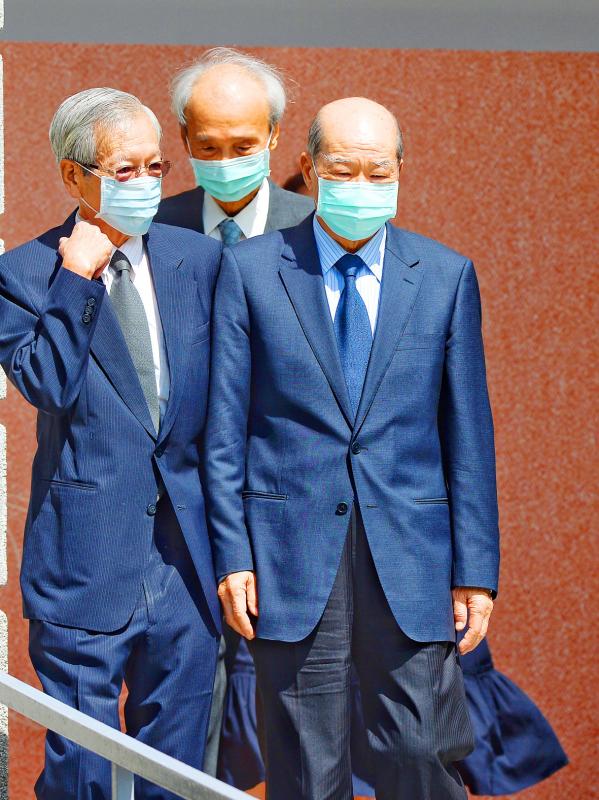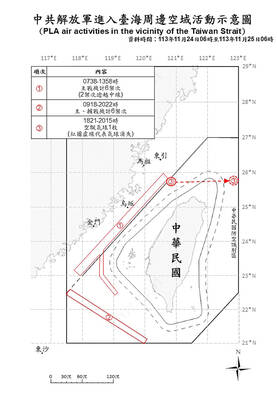Former Presidential Office secretary-general Huang Kun-huei (黃昆輝) on Saturday rejected former president Ma Ying-jeou’s (馬英九) claim that former president Lee Teng-hui (李登輝) had been a proponent of Beijing’s “one China” principle.
Lee, who served as president from 1988 to 2000, died in Taipei on Thursday last week.
After visiting the Taipei Guest House on Saturday to pay his respects to Lee, Ma posted on Facebook that “28 years ago on this day” Lee hosted a session of the now-defunct National Unification Council, during which he passed a resolution on the “one China” principle.

Photo: Lin Cheng-kun, Taipei Times
That resolution became the basis of the Chinese Nationalist Party’s (KMT) “one China, with different interpretations” framework that formed the foundation of the “1992 consensus,” Ma said.
The so-called “1992 consensus,” a term former Mainland Affairs Council chairman Su Chi (蘇起) in 2006 admitted making up in 2000, refers to a tacit understanding between the KMT and the Chinese government that both sides of the Strait acknowledge there is “one China,” with each side having its own interpretation of what “China” means.
In his post, Ma had called upon the public to “remember the historical importance of this resolution,” which he said both sides of the Taiwan Strait persistently promoted.
In August 1992, the year the resolution was passed, the Straits Exchange Foundation (SEF) and China’s Association for Relations Across the Taiwan Straits worked out a consensus on what “one China” means, and it was on the basis of that agreement that cross-strait relations developed prosperously through Ma’s presidency from 2008 to 2016, Ma said.
Huang said that Ma was “immoral and insincere for distorting history at a time like this.”
Huang — who in 1992 was Ma’s superior, serving as Mainland Affairs Council (MAC) minister, while Ma was a deputy minister — said the meeting in Hong Kong where Ma said the “1992 consensus” was reached was a routine encounter to review documents.
“How could there possibly have been discussions on national sovereignty issues at that meeting?” Huang said.
Prior to the meeting, Beijing had repeatedly insisted that Taiwan accept its “one China” principle, which Taiwanese officials up to that point had refused to do, Huang said, adding that during that meeting, no consensus was reached on any issue.
During a press conference following the meeting, Ma, who was also the MAC spokesman, even said the meeting was a failure, Huang said.
“How can Ma now say there was a ‘1992 consensus’?” he added.
Lee’s main purpose in establishing the National Unification Council was to discuss Taiwan’s internal policies related to unification, Huang said, adding that the body would not have passed any resolutions on the issue, nor would it have met with Chinese officials to discuss it.
Lee and former SEF chairman Koo Chen-fu (辜振甫) had both previously denied there was a “1992 consensus,” Huang said.
Ma choosing to assert otherwise after Lee passed away was “immoral,” he said.

A decision to describe a Chinese Ministry of Foreign Affairs statement on Singapore’s Taiwan policy as “erroneous” was made because the city-state has its own “one China policy” and has not followed Beijing’s “one China principle,” Deputy Minister of Foreign Affairs Tien Chung-kwang (田中光) said yesterday. It has been a longstanding practice for the People’s Republic of China (PRC) to speak on other countries’ behalf concerning Taiwan, Tien said. The latest example was a statement issued by the PRC after a meeting between Singaporean Prime Minister Lawrence Wong (黃循財) and Chinese President Xi Jinping (習近平) on the sidelines of the APEC summit

Taiwan’s passport ranked 34th in the world, with access to 141 visa-free destinations, according to the latest update to the Henley Passport Index released today. The index put together by Henley & Partners ranks 199 passports globally based on the number of destinations holders can access without a visa out of 227, and is updated monthly. The 141 visa-free destinations for Taiwanese passport holders are a slight decrease from last year, when holders had access to 145 destinations. Botswana and Columbia are among the countries that have recently ended visa-free status for Taiwanese after “bowing to pressure from the Chinese government,” the Ministry

HEALTHCARE: Following a 2022 Constitutional Court ruling, Taiwanese traveling overseas for six months would no longer be able to suspend their insurance Measures allowing people to suspend National Health Insurance (NHI) services if they plan to leave the country for six months would be abolished starting Dec. 23, NHIA Director-General Shih Chung-liang (石崇良) said yesterday. The decision followed the Constitutional Court’s ruling in 2022 that the regulation was unconstitutional and that it would invalidate the regulation automatically unless the NHIA amended it to conform with the Constitution. The agency would amend the regulations to remove the articles and sections that allow the suspension of NHI services, and also introduce provisional clauses for those who suspended their NHI services before Dec. 23, Shih said. According to

‘GRAY ZONE’ TACTICS: China continues to build up its military capacity while regularly deploying jets and warships around Taiwan, with the latest balloon spotted on Sunday The US is drawing up contingency plans for military deployments in Japan and the Philippines in case of a Taiwan emergency, Japan’s Kyodo news agency reported. They would be incorporated in a first joint operation plan to be formulated in December, Kyodo reported late on Sunday, citing sources familiar with Japan-US relations. A US Marine Corps regiment that possesses High Mobility Artillery Rocket Systems — a light multiple rocket launcher — would be deployed along the Nansei Island chain stretching from Kyushu to Yonaguni near Taiwan, Kyodo said. According to US military guidelines for dispatching marines in small formations to several locations,